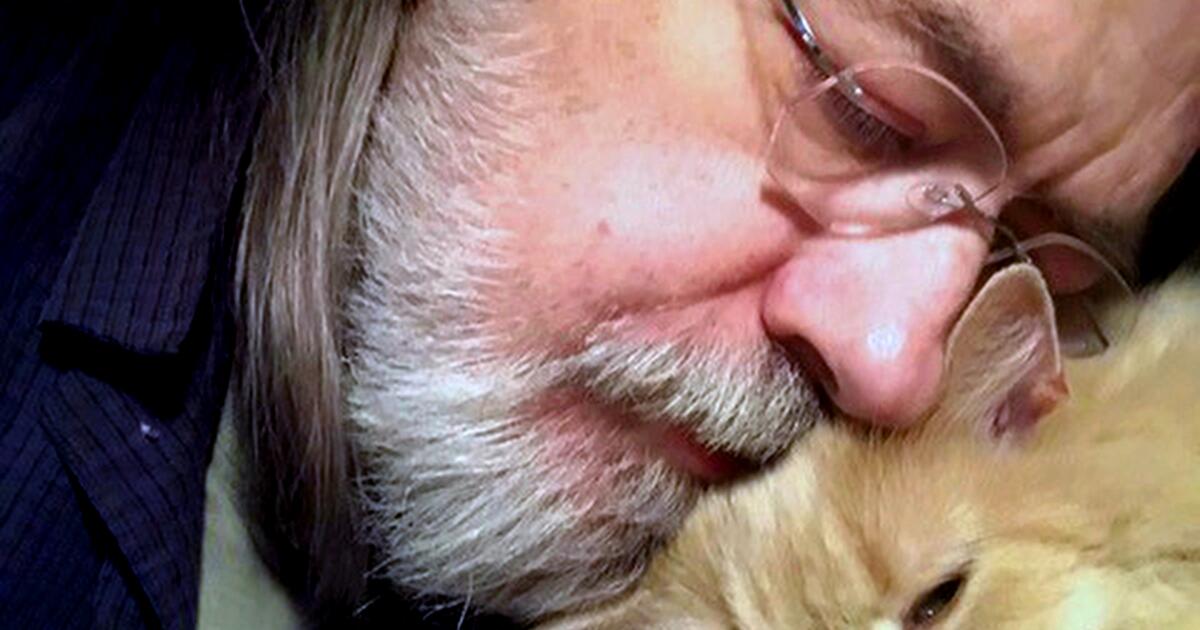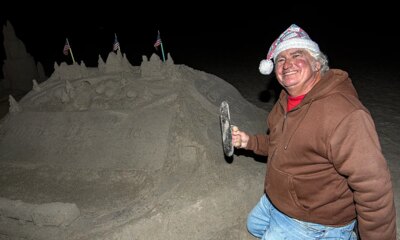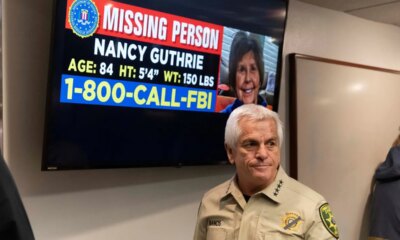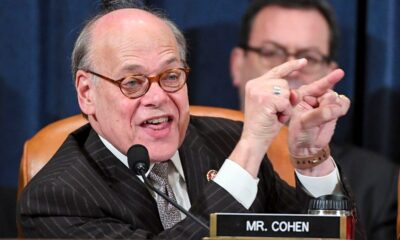Entertainment
Appreciation: For 'Alienist' author Caleb Carr, rescuing a cat meant rescuing himself

Caleb Carr, the novelist and military historian who died of cancer Thursday at age 68, was best known for exploring the darker angels of human nature. His breakout novel, “The Alienist” (1994), helped pioneer the historical thriller as we know it, telling the grisly tale of a child psychiatrist tracking a killer of young male prostitutes in 1890s New York. His other books include a sequel, “The Angel of Darkness” (1997), and a historical study of terrorism and warfare, “Lessons of Terror” (2002).
But when I had a late-night, hourlong conversation with Carr in late January, we mostly talked about our mutual love of cats.
Carr, his illness already far along, was eagerly awaiting the publication of what he correctly figured would be his final book, “My Beloved Monster.” It’s the story of his bond with Masha, the Siberian forest cat with whom he shared his fortress of a home in upstate New York, near a ridge called Misery Mountain. Contracted to do a third “Alienist” book, Carr instead called an audible, choosing to write his first memoir. Dipping briefly into his tortured childhood — he was regularly beaten by his father, the journalist and Beat poet muse Lucien Carr, and grew up in hardscrabble bohemian conditions on Manhattan’s Lower East Side — the book’s primary subject is how Carr found solace in the unconditional love of animals, and with his grief for Masha, who died in April 2022.
Staring down death, talking about grief, he was casually, effortlessly, macabrely funny that night. He spoke of how he argued with his publisher, Little, Brown, to forgo the standard “Author of ‘The Alienist’” tag on the front cover, which features a photo of his blond, fluffy rescue cat: “I thought, ’Guys, they’re going to think I wrote a book about murdering cats or some horrible thing.’” He discussed the challenges of getting cat lovers to read a Caleb Carr book: “We may have to convince them. These may not be people who spend their time reading grim stories about serial killers 130 years ago.”
And we talked a lot about what animals can teach us, and how they can even provide a kind of love that many of us didn’t know growing up. Even in childhood, when his father was knocking him down flights of stairs, Carr had pets to comfort him. “It’s amazing to think about it now, but there were cats, and other animals, that were trying to make me feel better,” he said. “The idea of that was so at odds with everything I was experiencing.”
I didn’t realize how much I had in common with the guy who wrote “The Alienist,” a book I admire for its vivid, doggedly researched detail but whose author I hadn’t studied. We were both basketball freaks; when we spoke, Carr’s beloved Knicks were on a roll (“They’re doing scarily well,” he said). We both survived childhoods fraught with danger, though mine wasn’t as dramatic or brutal as Carr’s. And we have both found comfort in the companionship of cats, known for self-sufficiency but also, quiet as it’s kept, quite loving and dependable when the chips are down. If you have a cat, and you’re not feeling well, that cat won’t stray far.
As we talked, my attention-hogging, gray-and-white tuxedo cat, Mr. Kitty, strolled in front of my laptop camera. “He’s cool-looking!” Carr enthused, the energy in his voice rising. I explained that he was a good cat but could also get pretty aggressive with his teeth and claws. He likes human flesh. “Well, they’re hunters,” Carr replied. “They’re wildlings. Sitting inside, being all the things that they’re pictured as being in Victorian literature, is not their nature.” Over the years I have always tried not to get mad at my cats for being cats — knocking things over, going on the attack when I least expect it. Carr’s words have actually helped me succeed in this endeavor.
“My Beloved Monster” by Caleb Carr
(Little, Brown)
Carr, too, could have been a wildling. “I could have been one of those dead-eyed drone troublemakers that comes out of an abusive household very easily, if it hadn’t been for cats,” he told me. His childhood home life was chaos, but he and his siblings always had pets. “All the animals we had really did teach us enough about love that we understood it outside of any human definition, although this was never something I talked about with anybody,” he said.
Carr’s longtime agent, Suzanne Gluck, was also a friend since they were both in high school at Friends Seminary in Manhattan. The irony of a future military historian attending a Quaker school is not lost on Gluck. “He was such a square peg in a round hole,” Gluck said in an interview the day after Carr’s death. “The administration really didn’t know what to make of him.”
He didn’t talk much about his home life then. And he was no misanthrope. “He was this pied piper,” Gluck said. “He was this very vibrant, interesting, thoughtful, charismatic guy with a lot of friends. He wasn’t someone sitting in the corner, troubled and wanting to be alone.”
Gluck recalls her response when Carr told her he was writing about Masha instead of serial killers: “This might be where the music stops.” The assignment, after all, called for more “Alienist.” But Bruce Nichols, then the publisher at Little, Brown and Carr’s editor, loved the story of Masha. (As the husband of a veterinary behaviorist , his might have been the perfect pair of eyes for the project.)
“When I read it, I just stopped thinking about ‘The Alienist,’” Nichols said. “I stopped thinking about fiction and just thought about all the great books that had been written as memoirs by dog and cat owners”— books like “Merle’s Door,” Ted Kerasote’s account of lessons learned from his Labrador mix. Carr, and Masha, got the go-ahead.
Readers should be thankful for that. Carr wasn’t in need of redeeming in his final years, but “My Beloved Monster” is nonetheless an act of redemption. It gives specific life, and teeth and claws, to that old cliché about how we don’t rescue animals; they rescue us.

Movie Reviews
Terry Mondragon’s ‘WETIKO’ (2022) – Movie Review – PopHorror

Weitiko changed my whole perception of foreign films. I only recently gave them another try, and some were actually pretty enjoyable. Weitiko saved me from fear of subtitles. I feel as if they ruin the experience of the film. However, Weitiko kept me wondering and also pretty surprised. I thought this would be a bad review, but it’s not at all. I left the film feeling fulfilled.
Let’s get into the review.
Synopsis
In the depths of the Maya jungle, a young Maya man hired to deliver hallucinogenic toads stumbles into a spiritual war between indigenous rebels and Euro-Western seekers, led by a parasitic white shaman with a thirst for power-and blood.
Island From Hell
I think the film portrays the idea of hallucinogens very well. Who wouldn’t want a magic psychedelic frog? I am very familiar with hallucinogens. I spent a lot of my 20’s going on fun trips from mushrooms or little tabs of joy. I also know it can get a little scary sometimes. Howeever lets stop talking about me and more about the movie. Weitiko may not have won me over at first with the subtitles, but they made the film worth all the twists and turns. Without being an action film, Weitiko focuses more on the cult they formed with a grumpy Shaman. Their experience starts off simple, a drop off of magic toads, like he has done many times. However, this time he ended up in the wrong spot. The details are easy to figure out at first. The film falls into very creepy vibes.
After the first interaction with the Shaman cult, because you are trying to get a girl. In the jungle, that’s not a wise choice most times. If you don’t accept their offerings, you would offend their god and make your poor soul suffer. The film seems very real, to be completely honest. If Jim Jones built a small empire in the jungle, and we all know how that ended up. It was pretty cool to see the beautiful landscape from above. Also, the scenery in the jungle makes you nervous around every corner. Then came the cave, with another filming location that was beautiful, even in the dark. All of this made the movie worth another watch from me. Not so much in my daily movie list for background noise while I work. Then again, who knows?
In The End
In the end, I can say I fully enjoyed the film, even with the subtitles you had to read or you’d miss the scene. It did not seem to bother me as much with Weitiko. The film also left me wondering about how many ancient tribes are in uncharted territory, and is this all real in life? Sometimes it makes me wonder. The film made me focus on something other than doomscrolling. It was easy to put together, but there are a few surprises that come when you try to escape with one of his cult members. I saw some things that made me wonder about the god they follow, is it man or spiritual?
I bet you have the same question.
Entertainment
Review: He dreams of becoming the ‘Goat’ in a sports movie that lacks competitive edge

We’ve seen animated animals belt out tunes in the “Sing” movies. We’ve learned about “The Secret Life of Pets” (twice). And we’ve visited them in “Zootopia” (also on two occasions). Now we get to see them play basketball. “Goat,” produced by Golden State Warriors prodigy Stephen Curry, is yet another underdog story about following your dreams wrapped in a by-the-numbers sports movie. It feels utterly unoriginal on multiple fronts.
Taking the popular acronym GOAT (Greatest of All Time) to its most literal form, the first feature by TV animation veteran Tyree Dillihay — from a screenplay by Aaron Buchsbaum and Teddy Riley — follows an anthropomorphic young goat who aspires to become the GOAT.
A lifelong fan of roarball (this film’s version of basketball), Will, who is voiced by Caleb McLaughlin, dreams of playing for his hometown team, Vineland. His admiration for the sport is embodied by Jett Fillmore (Gabrielle Union), Vineland’s most accomplished player, who carries the entire team on her back — she wants all the glory of victory for herself.
The world of “Goat” is divided between “smalls” and “bigs” (unlike “Zootopia” where the separation is between predators and prey). Will considers himself a “medium” but in the eyes of professional roarball players, he’s tiny. Still, after going viral for bravely challenging Mane Attraction (Aaron Pierre), one of the sport’s major stars who is double his size, Will lands a chance to play in the big leagues.
To the credit of the writers, roarball is a rather inclusive sport. There are no gendered teams, nor any discrimination based on species. Will might be the first “small” to make it big, but that stems from the public’s prejudice, not from rules that ban animals like him from playing.
Desperate for instant relevancy (like plenty of animated features these days), “Goat” is steeped in vapid internet references, from crypto to online memes. Sports fans, however, will find specific allusions, like contentious press conferences and even the kiss cam. Rowdy and kinetic from start to finish, “Goat” does in fact reflect the fast-paced dynamism of basketball, but it soon reveals itself a sugar rush without much substance.
Once Will joins the team, a “never meet your heroes” lesson ensues, since Jett feels like he’s usurping her position. Animosity on her part creates tension until Will opens up about his personal reason for playing. The emotions are not complex here, but they are heartfelt, thanks to how McLaughlin and Union conjure up larger-than-life personalities via their voice performances.
Meanwhile, Will’s other teammates — a rhinoceros, a giraffe (played by Curry himself), an ostrich and a Komodo dragon — don’t feel distinct enough from the ensemble casts of other animated projects like “Sing.” Each member of the assortment has their quirks, some of which occasionally yield a chuckle: Archie (David Harbour), the rhino, has two comically violent kid daughters.
There’s no denying “Goat” has a vibrant aesthetic, but that alone can’t overwrite its defects. Back in 2018, Sony Pictures Animation dazzled the industry when “Spider-Man: Into the Spider-Verse” introduced an approach that mixed 3D CGI with traditional hand-drawn animation. This combination of techniques doesn’t make “Goat” particularly unique anymore.
What’s most impressive, visually, about “Goat” is the way the natural world blends with the urban settings. Vineland, Will’s neighborhood, is indeed covered in vines and yet the vegetation appears organically integrated into the infrastructure. Each game takes place in a different ecosystem. The finale, for example, unfolds amid cracked volcanic rocks and lava. There’s visible handcraft and care in creating these backdrops for the action.
A mixed bag of eye-catching imagery and formulaic writing, “Goat” disappoints because it follows every expected path toward a triumphant conclusion. Its premise could have offered up a kid-friendly reading on failure that doesn’t simplify a way out of adversity. If talking animals will continue to be used as surrogates for human experiences — especially for young viewers — some nuance would be appreciated.
‘Goat’
Rated: PG, for some rude humor and brief mild language
Running time: 1 hour, 40 minutes
Playing: Opens Friday in wide release
Movie Reviews
Colum Eastwood’s ‘THE MORRIGAN’ (2026) – Movie Review – PopHorror

The Morrigan has a cool and promising plot line that immediately caught my attention, especially as someone who is a huge consumer of Gaelic mythology and folklore. The film follows an archaeologist who specializes in Gaelic legends as she travels with her teenage daughter to a remote region of Ireland. What begins as a research trip quickly turns into a fight for survival when a vengeful Pagan war goddess is unleashed from her ancient tomb. On paper, this setup feels tailor-made for atmospheric horror, blending history, mythology, and isolation into a potentially gripping experience.
Directed by Colum Eastwood, The Morrigan features a cast that should inspire confidence, including Saffron Burrows (Troy, The Bank Job), Toby Stephens (Die Another Day, Black Sails), and James Cosmo (Braveheart, Troy).
Unfortunately, despite this solid lineup, the film struggles to rise above its limitations. Whether it’s the modest budget, uneven editing, or a combination of both, the execution never fully matches the ambition of the concept. The story has all the right ingredients, but the final product feels undercooked, as if the film never quite finds its footing.
That said, the lighting and cinematography do manage to pull some weight. The film leans heavily into shadow, fog, and bleak landscapes, creating a consistently dreadful atmosphere that suits the material well. There are moments where the visual mood genuinely works, capturing the eerie isolation of rural Ireland and hinting at the ancient terror lurking beneath the surface. These elements suggest that the filmmakers understood the tone they were aiming for, even if they couldn’t fully achieve it.
Where the film falters most is in the performances.
None of the actors truly separate themselves from the material, and the acting often feels stiff or underdeveloped. Rather than grounding the supernatural elements with emotional weight, many scenes come across more like a school talent show than a professional feature film. This lack of believable character work makes it difficult to invest in the stakes, and as a result, the horror never hits as hard as it should.
Cineverse has built a strong reputation in recent years for supporting indie horror, often ranking alongside genre powerhouses like the old Dimension Films and, more recently, XYZ Films. Because of that, expectations for The Morrigan are understandably higher. While it’s inevitable that any studio will have a few misses, this unfortunately feels like one of them. The foundation is there, but the execution fails to capitalize on its potential.
Ultimately, The Morrigan is a film that feels like a missed opportunity. With stronger material, tighter editing, and more compelling performances, it could have been a standout entry in the mythological horror subgenre. Instead, it settles for being an intriguing idea that never fully comes to life, leaving viewers with the sense that they’ve seen the outline of a great film rather than the finished product.
-

 Politics1 week ago
Politics1 week agoWhite House says murder rate plummeted to lowest level since 1900 under Trump administration
-

 Alabama6 days ago
Alabama6 days agoGeneva’s Kiera Howell, 16, auditions for ‘American Idol’ season 24
-

 Politics1 week ago
Politics1 week agoTrump unveils new rendering of sprawling White House ballroom project
-

 San Francisco, CA1 week ago
San Francisco, CA1 week agoExclusive | Super Bowl 2026: Guide to the hottest events, concerts and parties happening in San Francisco
-

 Ohio1 week ago
Ohio1 week agoOhio town launching treasure hunt for $10K worth of gold, jewelry
-

 Culture1 week ago
Culture1 week agoAnnotating the Judge’s Decision in the Case of Liam Conejo Ramos, a 5-Year-Old Detained by ICE
-

 Culture1 week ago
Culture1 week agoIs Emily Brontë’s ‘Wuthering Heights’ Actually the Greatest Love Story of All Time?
-

 News1 week ago
News1 week agoThe Long Goodbye: A California Couple Self-Deports to Mexico


















